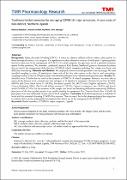Traditional herbal remedies for managing COVID-19 major symptoms: A case study of Kole district, Northern Uganda
Date
2021Author
Nakaziba, Rebecca
Anyolitho, Maxson Kenneth
Kabunga, Amir
Metadata
Show full item recordAbstract
Background: Today, the world is battling COVID-19 which has claimed millions of lives within a short period. As biotechnological research is in progress, it’s expedient to explore alternative sources of medication. Exploring plants that have been used in the management of COVID-19 related symptoms for ages may unveil a potential treatment option for this pestilence. We, therefore, conducted a study in Kole district, Northern Uganda to document the plants that are used in the management of the four key COVID-19 related symptoms including flue, cough, sore throat, and difficulty in breathing. Materials and Methods: We employed a cross-sectional quantitative survey design. We used stratified sampling to select 50 participants from each of the five sub-counties in the district, and convenience sampling to select a total of 250 participants and administered interviewer-administered questionnaires. Results: We identified over 50 herbs that are used in the treatment of COVID-19 related symptoms. However, we were able to report on the fourteen most common ones that belonged to 12 families in this paper. Clematis hirsute Perr. & Guill, (68.0%) and Citrus limon burm. F. (30.8%); Eucalyptus grandis M., (49.2%) and Zingibar officinalis, (28.0%); Conyza floribunda H.B.K. (26.4%) and Allium sativum A. (23.6%); Capparis tomentosa Lam. (19.4%) and Acacia hockii De Wild, (17.4%): for the treatment of flu, cough, sore throat and breathing difficulties respectively. Different plant parts of the diverse plant species were used in treating the symptoms. For Clematis hirsute Perr. & Guill, all plant parts were used differently to treat each of the 4 symptoms. Conclusion: Kole district possesses a multitude of herbs with the potential of treating COVID-19 symptoms. There is a need for further pharmacological investigations to validate their activity and possible development for clinical use in the management of COVID-19.
Collections
- Research Articles [41]

